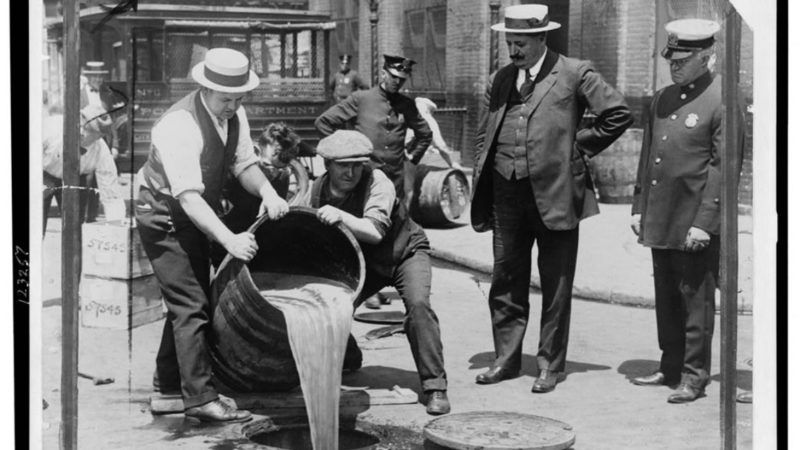Alcohol Prohibitionists Aren't Happy About COVID-19 Exceptions for Bars and Restaurants
Too bad. Deregulation could (and should) be here to stay.

Of all the deregulatory efforts undertaken during the pandemic, the loosening of state and local alcohol regulations has been perhaps the most noticeable, welcome, and widespread to date.
Take to-go cocktails. At least 30 states have moved to allow to-go alcohol sales by bars and restaurants temporarily during the pandemic. Many jurisdictions have also relaxed alcohol delivery rules.
Now, some of these moves are being made permanent. Late last month, for example, Iowa lawmakers, who'd already moved to allow bars and restaurants to sell take-out cocktails, decided to make those changes permanent. At least four other states are considering similar permanent legislation.
That's great news. As someone who's long called for relaxing burdensome alcohol regulations, I support deregulation before, during, and after the pandemic. And if deregulating alcohol was a really good idea before the pandemic, the government-ordered closure of bars and restaurants has made that really good idea essential during the pandemic.
After all, alcohol sales can easily be the most profitable part of a meal for many restaurants. And bars that don't serve food cease to exist without sufficient alcohol sales. Smaller (non-chain) bars and restaurants in particular are hemorrhaging cash. Expanding alcohol revenue has helped some restaurants and bars continue to employ and pay their employees. Even regulators acknowledge loosened alcohol rules have "provided a 'lifeline' to eateries during the lockdown."
Is there a downside to loosening booze rules? I don't think so. While data suggest Americans have increased our alcohol consumption during the pandemic, harms tied to alcohol have also decreased. For example, data show drunk driving arrests are "down dramatically" during the same period.
But not everyone thinks alcohol deregulation is a good thing. Indeed, while bar and restaurant owners and members of the public have welcomed looser alcohol rules during the pandemic—with many favoring they be made permanent—a handful of activists are taking the opposite approach.
Alcohol Justice is one such voice. The Marin County, California-based nonprofit, which pledges to "hold Big Alcohol accountable," has been busy combating temporary (nevermind permanent) rollbacks of alcohol regulations, lest the gilded streets of Marin County start to resemble something akin to the toilets at CBGB.
"Cities in Marin could soon end up looking like seedy, inebriated Bourbon Street in New Orleans, under the guise of reviving patronage for a few struggling licensees" who sell booze, Alcohol Justice's Michael Scippa argued in a Marin Independent Journal op-ed last week.
(Disclosure: I believe drinking alcohol in public in New Orleans is one of life's greatest joys.)
In an April letter to California state alcohol regulators, Scippa's boss, Alcohol Justice head Bruce Livingston, argued that while the group "do[es] not advocate policies that deliberately force licensees to close permanently….ABC should be actively preparing to permanently retire licenses in areas that are already overconcentrated" (emphasis in original).
Others have even used the pandemic as an excuse to ramp up alcohol regulations or even to ban alcohol. In an April column, for example, I detailed calls to ban alcohol sales during the pandemic—ostensibly, supporters argued, to prevent domestic violence during the pandemic—and criticized them as misguided.
Even before the pandemic, one Atlantic writer lamented the purported "dearth of anti-alcohol advocacy" in this country.
If America is lacking in anti-alcohol advocacy—and it's not—then that alleged shortfall is more than made up for by the sheer quantity of awful alcohol laws we have. From dry counties to happy hour bans to the repugnant, mandatory three-tier system, alcohol regulation in this country is infested with the vestiges of Prohibition. 100 years after Prohibition allegedly ended, its stench lingers still. Deregulation—which is happening now, finally, in a piecemeal fashion—is the only sensible approach to regulating alcohol.
But to say that many alcohol restrictions make little sense is not to say there aren't any restrictions on alcohol sales I support. For example, some jurisdictions have re-closed bars they had allowed to reopen, after COVID-19 cases spiked in those areas. Given experts suggest drinking in an indoor bar puts one at a high risk of catching the virus, reviving that limited, temporary restriction makes sense.
So too, though, does letting bars and restaurants sell cocktails and other alcohol beverages to go. Now. Tomorrow. And forever.


Show Comments (80)